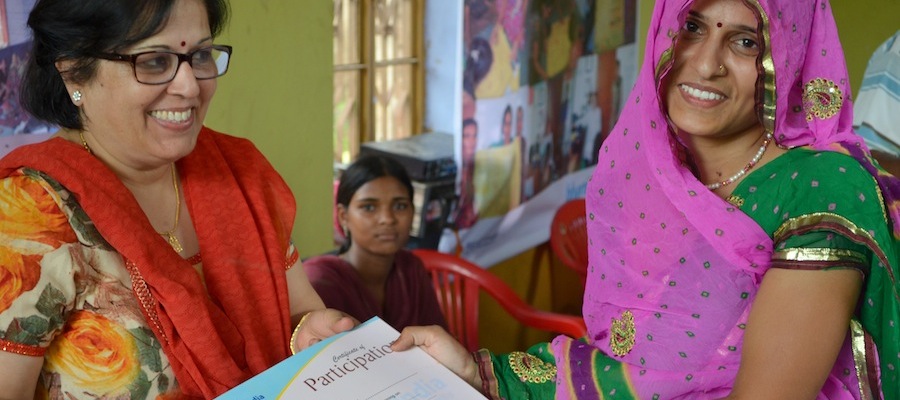
1 Create a safe space: Women in South Asia often have nowhere to gather with other women and talk about issues like gender equity, women’s rights, or health. READ Centers provide a safe, trusted space for women to gather and learn.
2 Support independence and mobility: Most women in rural Nepal and India have to ask their husbands for permission to leave home. Because of their local READ Center, a large majority of women (75-77%) report being able to freely travel outside of their home unaccompanied.
3 Teach women to read: If you are illiterate, simple things like reading signs on a road, numbers on a phone, or directions on a medicine bottle make daily life a struggle. READ Centers teach thousands of women to read each year.
4 Increase savings and income: 63% of women increased their savings or income after joining savings cooperatives at READ Centers in Nepal. Savings cooperatives allow women to invest money and then take turns receiving micro-loans to start micro-businesses or invest in education for their children.
5 Teach job skills and seed businesses: Women learn beekeeping, mushroom farming, sewing, and other income-generating skills through training programs at READ Centers. One in five Nepali women report going on to start her own income-generating business after joining a savings cooperative and taking skills training at a READ Center.

6 Build self-esteem and confidence: A majority of women (58-83%) report that their self-esteem or confidence has increased since coming to a READ Center – helping them to become more comfortable speaking in front of groups and sharing opinions.
7 Boost decision-making power: About two-thirds of women in Nepal (62%) and India (68%) say that they have greater decision-making power in their homes and communities as a result of coming to the READ Center.
8 Impact health: Women report increased influence in their families and communities after receiving training or information from their local READ Center on health care, family planning, domestic violence and reproductive rights. Almost all READ Center users (88-97%) access health information and services at Centers that they would not otherwise be able to access.
9 Build networks: By building social networks, women have more support and greater opportunities to effect change in their communities. Three-quarters of women in Nepal and half in India and Bhutan report expanding their network through their local READ Center. Women say that once this network is in place, they are emboldened by the knowledge that they are not alone in facing issues like domestic violence, reproductive health or family planning, and that they are inspired to help other women in their community by sharing the knowledge they have learned about these topics.
10 Create public leaders: In South Asia (particularly Bhutan), women rarely hold public leadership roles. READ Centers provide leadership training for women to increase their presence in the public sphere. 61-65% of women report that they are now able to express their opinions in public or in their home. Women report joining committees, facilitating meetings, participating in protests, raising their voices against violence, and organizing community programs.




